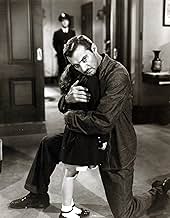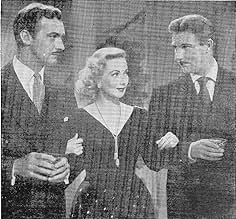Füge eine Handlung in deiner Sprache hinzuA woman impulsively murders her sister after discovering she has been having an affair with her fiancé, and later plans on killing the little girl who may have witnessed the crime.A woman impulsively murders her sister after discovering she has been having an affair with her fiancé, and later plans on killing the little girl who may have witnessed the crime.A woman impulsively murders her sister after discovering she has been having an affair with her fiancé, and later plans on killing the little girl who may have witnessed the crime.
- Regie
- Drehbuch
- Hauptbesetzung
- Auszeichnungen
- 1 wins total
- Dr. Caroline Canford
- (as Nancy Davis)
- Orderly
- (Nicht genannt)
- Juror
- (Nicht genannt)
- Courtroom Spectator
- (Nicht genannt)
- Attendant
- (Nicht genannt)
- Attendant
- (Nicht genannt)
- Intern
- (Nicht genannt)
Empfohlene Bewertungen
This is an unusual film due to the casting. This is NOT a complaint, but seeing Ann Sothern playing a killer is interesting, as she usually played nice, sweet folks like her Maisie character from the 1940s. At first, you can understand her motivation in killing her sister...but to see her attempting to murder an innocent child...that is a dark and twisted character! Additionally, this is one of the few films I've seen where Nancy David (Reagan) is given a chance to really act and she was quite nice as the child psychiatrist, Caroline. In other films, such as "Hellcats of the Navy" and "The Next Voice You Hear", Davis never really had a chance to shine as an actress.
As for the film itself, it is very good and worth seeing. It's also very unusual for MGM...a studio that wasn't known for such dark films back in 1950. In general, film noir pictures were done by other studios and MGM preferred making 'nice' movies...but here they've created a rather hard-hearted film! This is NOT a complaint...I liked the film and can easily recommend it to anyone.
By the way, one odd thing you see in the film is 'hydrotherapy'. Back in the bad old days of psychiatric treatment, hospitals often used baths to somehow try to cure or alleviate suffering in mental patients. In the really bad old days, it was ice water! Here, in the more enlightened 20th century, the baths were less traumatic and more soothing--with warm water. Of dubious value...but at least not harmful in the latter.
A nifty psychological hot pot this one. Story centers on a young child called Susan Starrling (Perreau), who after witnessing the murder of her step-mother, succumbs to amnesia. Which is inconvenient for her father since he has been convicted of the murder and sent down to await execution. Can determined psychiatrist Caroline Cranford (Davis) eek the truth out of Susan's troubled memory? Can the real killer ensure that that isn't the case?
It's a personal thing of course, but I have always found there to be something off kilter about doll's houses, and here we are greeted to an opening shot of one, superbly accompanied by Previn's ominous music, it's a perfect mood setter as to what is to come. Story lacks any mystery dynamic since we are privy to exactly what has gone on regarding the who, why and what fors, and in truth the outcome of it all is never really in doubt. So for although it's a thriller pic dressed up in film noir clobber, it doesn't have the verve or devilment to really be classed full bodied as such. But that's by the by, visually and the presence of a child in peril, with main character disintegration the key feature, puts it into noir lovers considerations.
Since the title features the word shadow it's no shock to find shadows and low lights feature prominently. The lighting effects are very striking, the changes in contrasts perfectly befitting the mood of certain scenes. Such as when dialogue is implying emotional discord, or the silent mindset of our antagonists, while a couple of neat shadow smother shots are killer narrative boosts. The main building of the piece is not the doll's house, but that of the hospital where Susan is receiving treatment, and at night photographer Ray June perfectly sets it up for peril and dastardly deeds. While we also get a bit of wobble screen to signify troubled mental confusion.
Cast range from adequate to very good. Honours go to Perreau, who is never once annoying, turning in an involving performance that has us firmly involved in her world, whilst Davis (the future First Lady Reagan) is very understated, where she gets a well written female character whose not relying on male dominance to expand the part. And with Jackson directing in an unfussy manner it rounds out as a pic worth seeking out. 7/10
Looks like this was another B-movie from MGM's Dore Schary period when he was refashioning the studio's star-studded image. The under-rated Scott and Sothern are certainly playing against type, he as a kind-hearted father, she as a cold-hearted murderess. Oddly, the screenplay shares focus among these four players instead of centralizing one or two as is usually the case. In terms of actual screen time, it's probably Nancy Davis's movie, though she was likely too unknown to get star billing. Then too, whatever happened to Kristine Miller as Scott's faithless wife. She certainly looks the part and acts it wickedly.
Speaking of talented unknowns, director Pat Jackson put this neat little package together. His career appears a rather brief one, mainly in England, where he also directed several episodes of the cult TV series, The Prisoner. Too bad he disappeared so quickly, because there are a number of nice directorial touches here. Note Pike's (John McIntire) shadow engulfing Dell (Sothern) at movie's end indicating the retribution to come; the blurry special effects mirroring little Susan's traumatized mental state; the suggestive hair-drier closing over Dell's head like an electrocution helmet; the great noirish shot of Dell framed against ominous skyscrapers suggesting dark powers looming over Susan. Anyway, this all adds up to a very effective little thriller, proving that even though late to the party, MGM could B- movie with the best of them.
as the psychiatrist trying to help little Susan (Gigi Perreau in a very
good performance) remember a horrible event which she had
witnessed. Zachary Scott, one of my favorites, proved real men can
handle supporting roles with as much flair as the more substantial
roles. And imaginative casting with Ann Southern as the baddie --
she handled it well without going over the top (as some
comedians are tempted to do with dramatic roles). Script could
have used a little more meat and the ending could have been a bit
more imaginative, but, all in all, not a waste of ninety minutes of
your time.
Wusstest du schon
- WissenswertesThe novel upon which this film is based, "Death in a Doll's House", was serialized in The Saturday Evening Post from January 16 to February 27, 1943.
- PatzerWhen Dell frantically flips through the front section of a newspaper looking for an article about the possible demise of her step-niece, the prop newspaper clearly has no name banner, headlines, photos or ads.
- Zitate
Susan Starrling: I'm glad Celia went to the early show. I don't think she likes us very much.
David I. Starrling: Susan, what a dreadful thing to say about your mother.
Susan Starrling: She's not my mother. My mother's dead. You said so yourself.
David I. Starrling: Celia's your mother now. It's not easy for her. Promise me you won't say thing like that again.
Susan Starrling: OK, I promise. I won't say it again. But I'll still think it.
Top-Auswahl
Details
- Erscheinungsdatum
- Herkunftsland
- Sprache
- Auch bekannt als
- Muñecas delatoras
- Drehorte
- Produktionsfirma
- Weitere beteiligte Unternehmen bei IMDbPro anzeigen
Box Office
- Budget
- 701.000 $ (geschätzt)
- Laufzeit1 Stunde 24 Minuten
- Farbe
- Seitenverhältnis
- 1.37 : 1


































